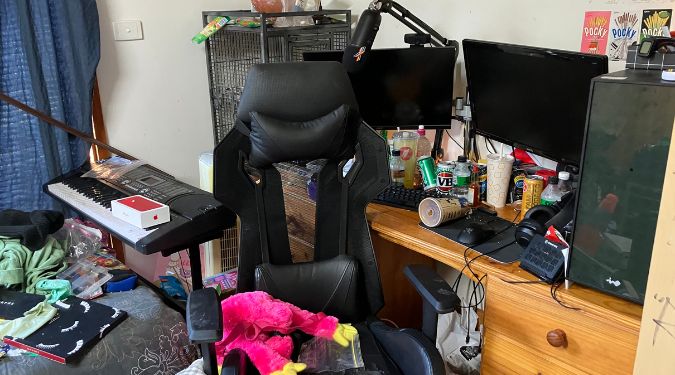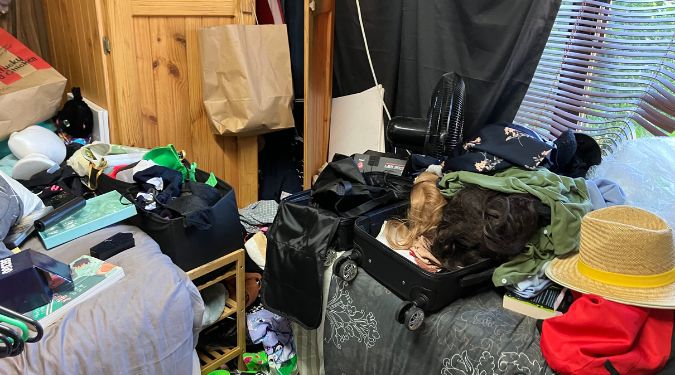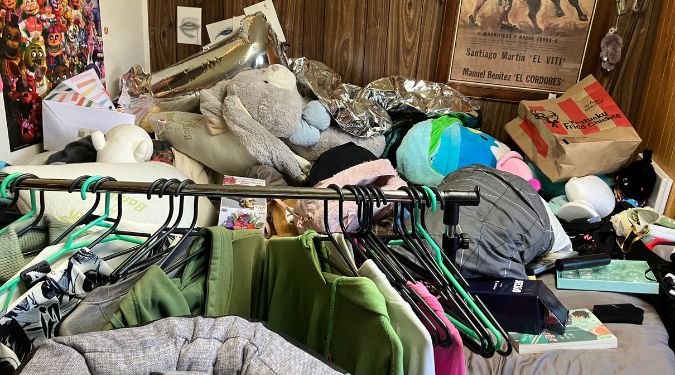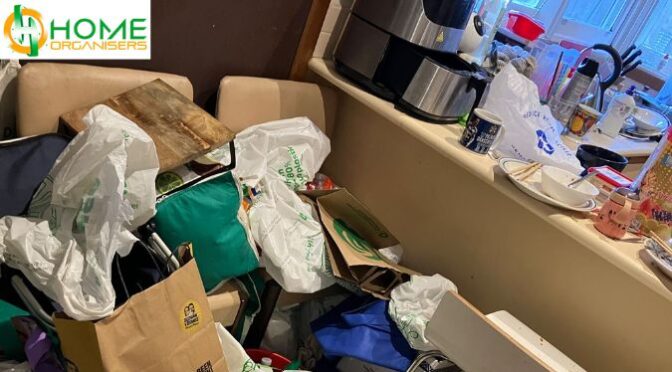At Home Organisers, we believe that a clean and well-organised home is more than just a nice place to live — it’s the foundation for better health, safety, and peace of mind. For many NDIS participants, clutter can create barriers to independence, safety, and everyday tasks. That’s why we work closely with Support Coordinators to make decluttering simple, personalised, and stress-free.
This blog explains how we partner with NDIS support coordinators help to design and deliver seamless collaborative decluttering plans that support not only the participant’s physical space, but also their overall health, wellbeing, and lifestyle. We’ll explore the benefits from different angles — including mental and emotional health, safety, productivity, and family life — using easy-to-understand language throughout.
Why Decluttering Matters: More Than Just “Cleaning Up”
Clutter is more than piles of things. It can cause stress, create tripping hazards, make everyday tasks harder, and even affect a person’s mood and confidence. For someone living with a disability or mental health challenge, clutter can feel overwhelming or even impossible to manage alone.
Decluttering with the right support can:
- Make homes safer
- Free up space for movement
- Create calm and focus
- Build confidence and independence
That’s where we come in. Home Organisers works alongside NDIS support coordinator help to turn cluttered spaces into safe, calm, and organised homes — one step at a time.
How We Collaborate With Support Coordinators
Support Coordinators play a key role in helping NDIS participants find the right service providers. When a participant needs help with their home environment, we make the process as smooth as possible for both the participant and their coordinator.
Here’s how our partnership works:
Clear Communication
We start by speaking with the NDIS support coordinator help to understand the participant’s goals, needs, and funding. This helps us plan a decluttering service that matches their NDIS plan.
Personalised Plans
No two homes or people are the same. We customise our approach based on the participant’s abilities, preferences, and comfort level. Some people want hands-on help. Others prefer we work quietly in the background. Either way, we respect their space and pace.
Documentation and Reporting
We provide clear, simple updates and reports. This helps NDIS support coordinator help track progress, manage budgets, and keep records for plan reviews.
Reliable, Caring Service
Our team is trained to work with people living with physical disabilities, neurodivergence, hoarding behaviours, trauma, or mental health conditions. We are always patient, understanding, and respectful.

Mental and Emotional Benefits of Decluttering
A cluttered home can lead to a cluttered mind. Many people feel anxious, low, or overwhelmed when surrounded by mess. For someone already managing mental health issues or stress, clutter can make things worse.
Decluttering helps:
- Reduce anxiety and depression
A clear space creates a sense of calm and control. - Improve focus and decision-making
With less visual noise, it’s easier to concentrate and think clearly. - Boost self-esteem
A tidy space makes people feel capable and proud. - Lower emotional overwhelm
Decluttering in small, supported steps helps avoid feeling stuck or helpless.
By working with NDIS support coordinator help, we help participants gently and safely regain control of their space — and feel better emotionally, too.
Physical and Health Improvements
A cluttered home can be risky. Tripping over items, reaching over piles, or having limited access to key areas (like the kitchen or bathroom) can lead to accidents and health issues.
Physical benefits of decluttering include:
- Fewer falls and injuries
Clear walkways and open spaces make it easier to move safely. - Improved hygiene
Less clutter makes cleaning easier, reducing dust, mould, and allergens. - Better sleep
A tidy, calm bedroom helps promote restful sleep. - Easier daily routines
When items are easy to find, daily tasks take less time and effort.
NDIS support coordinator help can rely on us to support participants with physical limitations by carefully planning how we declutter, always putting their safety first.
Family and Relationship Benefits
Clutter doesn’t just affect the person living in it. It can cause tension and stress for family members, support workers, and visitors too.
Decluttering can:
- Reduce arguments and stress at home
- Make it easier for the family to help and support
- Encourage social visits and reduce isolation
- Support children and carers with a more functional home environment
When participants feel more in control of their space, it has a positive ripple effect on their relationships and support network.

Boosting Productivity and Independence
When a person’s environment is organised, it becomes much easier to do things on their own. They can find what they need, move around freely, and complete tasks with confidence.
Benefits for daily productivity:
- Easier access to essentials like medication, clothes, and documents
- Encourages self-care and routines
- Fewer distractions and more motivation
- Participants are more likely to enjoy activities and hobbies
We work alongside NDIS support coordinator help to help participants build simple systems — like labelled containers, clear zones, and checklists — to keep their space functional and manageable.
Supporting Long-Term Wellbeing
Decluttering is not a one-time fix. It’s a skill and mindset that grows over time. Our goal is to support participants in creating sustainable habits that lead to long-term wellbeing.
We take a gentle, non-judgmental approach. Whether we’re working with someone experiencing hoarding behaviour or just struggling to keep up with everyday mess, we never rush or force. Instead, we build trust, work together, and celebrate small wins.
Long-term wellbeing benefits:
- Greater stability in daily life
- Stronger sense of purpose and routine
- More enjoyment and pride in the home
- Increased confidence in making decisions
NDIS support coordinator help can feel confident referring participants to us knowing we are focused on the person, not just the task.
Financial and Wealth-Related Benefits
It might seem surprising, but decluttering can also lead to financial benefits. When homes are organised, people can find what they already own, avoid duplicate purchases, and reduce unnecessary spending.
We also help participants sort through bills, paperwork, and other important documents to prevent missed payments or lost forms.
Financial gains of decluttering:
- Avoid buying things you already have
- Save time (and money) by being more organised
- Prevent damage to items caused by poor storage
- Make it easier to track and manage expenses
Support Coordinators managing life admin can also benefit from our support, as we create clear systems for the participant to stay on top of their day-to-day responsibilities.
Tailored Decluttering for All Levels of Need
Some participants need just a few hours of help. Others may require ongoing support due to complex needs or hoarding behaviours. We adapt to all situations and always check in to see how the participant is feeling and progressing.
Examples of tailored support:
- Light decluttering – organising drawers, cupboards, or clothing
- Room makeovers – transforming one space at a time (e.g. bedroom, kitchen)
- Whole-home support – working over weeks or months to transform an entire home
- Ongoing maintenance – regular visits to keep things on track
We respect each person’s pace and emotional readiness. Our work is never rushed or forceful — just steady, supportive, and consistent.
Building a Partnership That Works
We see NDIS support coordinator help as partners in care. You understand the participant’s broader goals, and we bring the hands-on help to make those goals real — especially when it comes to living in a safe, calm, and comfortable home.
Here’s what you can expect when partnering with us:
- Quick response times
- Clear quotes and scope of work
- Progress updates and final reports
- Flexibility with changes in plan or funding
- A calm, kind, and respectful team

Final Thoughts: Together, We Create Change That Lasts
At Home Organisers, we’re not just cleaning up homes — we’re helping people feel safe, supported, and in control of their lives again. With the guidance of NDIS support coordinator help and the trust of our participants, we create personalised collaborative decluttering plans that focus on real outcomes.
Whether your participant home support is overwhelmed by clutter, struggling to find things, or simply needing a reset, we’re here to help — with compassion, care, and a clear plan that works.
If you’re a Support Coordinator looking for a reliable decluttering partner who understands NDIS, we’d love to work alongside you to help your participants live better, safer, and happier in their own homes.
Ready to support your participants with safe, stress-free decluttering?
Call us on 03 8583 9103, email nancy@homeorganisers.com.au, or visit homeorganisers.com.au to get started today.
✅ Case Study 1: Regaining Confidence and Control Through Collaborative Decluttering
Client: Susan, 54, NDIS Participant living with PTSD and chronic pain
Support Coordinator: Emma, Local Area Coordinator in Melbourne
The Situation:
Susan had been struggling for years to keep her home in order. Due to chronic back pain and trauma-related anxiety, everyday tasks like folding laundry or sorting paperwork became overwhelming. Over time, clutter built up in every room — blocking walkways, hiding important documents, and causing emotional distress. She began avoiding visitors and reported feeling “stuck and ashamed.”
Emma, Susan’s NDIS support coordinator help, reached out to Home Organisers for a solution that was both sensitive and sustainable. The goal wasn’t just a tidy house — it was to help Susan regain confidence, independence, and peace of mind in her own space.
Our Approach:
We scheduled an in-home consultation where Susan and Emma could walk us through the areas of concern. We listened carefully, worked at Susan’s pace, and created a collaborative decluttering plan that broke the home into manageable zones. Over several weeks, our team supported Susan in decluttering her bedroom, kitchen, and lounge — gently encouraging her to make decisions she felt good about.
We also helped create practical organising systems, such as labelled baskets for medication, mail, and personal items, making it easier for Susan to manage daily life on her own.
The Outcome:
- Susan now moves confidently and safely through her home.
- She has resumed inviting family over for tea — something she hadn’t done in over two years.
- Her sleep improved thanks to a calm, clutter-free bedroom.
- Emma reported noticeable improvements in Susan’s mental health and engagement with her support plan.
✅ Case Study 2: From Crisis to Calm – Supporting a Participant Home with Complex Needs
Client: Mark, 38, NDIS Participant with autism and hoarding disorder
Support Coordinator: Laura, Specialist Support Coordinator
The Situation:
Mark was referred to us after his NDIS support coordinator help, Laura, noted the high level of risk in his home. Years of unaddressed hoarding behaviour had filled his one-bedroom unit with unused appliances, unopened packages, and old clothing. He struggled to find his medication, couldn’t access key living areas, and was at risk of falls and injury.
Mark’s sensory sensitivities and anxiety made him extremely cautious around new people. He had previously refused help from cleaners and was resistant to changes in his environment. Laura needed a service provider who understood mental health and could provide trauma-informed participant home support.
Our Approach:
We introduced Mark to the same two team members for every visit to build familiarity and trust. In the first few sessions, we didn’t touch anything — we just talked, listened, and made a plan together.
Once Mark was ready, we began with a small area: the kitchen bench. Through collaborative decluttering, we celebrated each choice Mark made, whether it was keeping, donating, or discarding an item.
Sessions were spaced out over two months, with regular check-ins from Laura to ensure alignment with his NDIS goals and emotional readiness. We also worked with Laura to document progress for NDIS reporting.
The Outcome:
- Mark now has access to his kitchen, bedroom, and bathroom.
- He independently maintains the systems we created (e.g., colour-coded tubs for medication, food, tools).
- He reports feeling “less heavy” and more in control of his space.
- Laura was able to secure continued funding for home support, backed by detailed progress reports.
FAQs on the Mental and Emotional Benefits of Decluttering
- 1. My client feels ashamed of their cluttered home. How do you approach decluttering without judgment?
We completely understand that clutter can be emotional and overwhelming. Our team takes a gentle, non-judgmental approach. We work at the participant’s pace, always respecting their space, choices, and comfort. Our goal is to build trust and create a safe, supportive environment — never to shame or rush anyone.
- 2. What if my participant has hoarding tendencies and struggles to let go of things?
We have experience working with individuals with hoarding behaviours. Our team uses compassionate, step-by-step methods to reduce overwhelm and help participants feel in control. We never throw anything away without consent, and we focus on progress — not perfection.
- 3. Can this decluttering service be included in my client’s NDIS plan?
Yes, if the participant’s plan includes funding under Core Supports or Capacity Building for daily living support, our decluttering service can usually be included. We can provide quotes and service agreements tailored to NDIS guidelines.
- 4. How involved do Support Coordinators need to be during the process?
We make it easy for you. Once a plan is agreed upon, we provide regular updates, clear documentation, and open communication. Whether you prefer to be hands-on or take a step back, we adapt to your preferences.
- 5. My participant feels emotionally attached to their belongings. Can you still help?
Absolutely. Emotional attachment is common, especially for participants who have experienced trauma, grief, or change. We approach this with kindness and patience, helping participants make decisions they feel good about — without pressure.
- 6. What’s the first step in getting support for my client’s home decluttering?
Simply call us at 03 8583 9103, email nancy@homeorganisers.com.au, or fill out the enquiry form on our website. We’ll arrange an initial consultation to understand your participant’s needs and goals.
- 7. Can you help create systems that make it easier for my participant to keep their space organised?
Yes. We don’t just declutter — we create simple, sustainable systems (like labels, storage solutions, or task routines) to help participants maintain order long after we leave.
- 8. What if my participant has had bad experiences with other services?
We’re here to rebuild trust. Many of our clients come to us after feeling rushed, judged, or unsupported elsewhere. We take extra care to listen, adapt, and create a calm, positive experience from day one.
- 9. How long does a decluttering job usually take?
It depends on the size of the space, the level of clutter, and the participant’s pace. Some projects take a few hours, while others are spaced out over weeks. We always work around what’s best for the participant’s comfort and capacity.
- 10. Can you support participants with both physical and mental health challenges?
Yes. Our team is experienced in supporting participants with physical disabilities, chronic conditions, anxiety, depression, autism, PTSD, and more. We tailor our approach with sensitivity to both physical and emotional needs.



